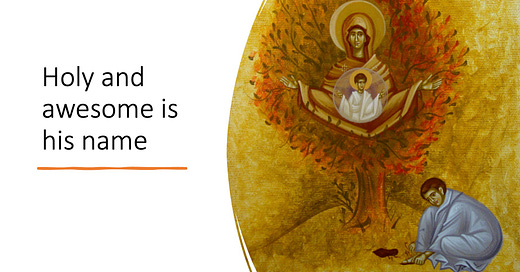Holy and awesome is his name.
Psalm 111:1-2, 4-5, 9 and 10c. January 17, 2023 - Tuesday, Memorial of Saint Anthony, Abbott
Psalm 111 is a hymn in praise of the Lord. The psalmist states that he will sing God’s praises with all his heart. The phrase “with all my heart” reminds us of the first commandment of love: you shall love your God with all your heart (see Deut 6:5). Moreover, he is going to sing his praise in the assembly of the faithful. His praise of the Lord becomes a proclamation of faith. He does not keep it to himself but wants to share it with others. The book of Tobit found only in the Catholic and Orthodox Bible, includes this piece of advice from the angel Raphael: “It's a good idea to keep a king's secret, but what God does should be told everywhere, so that he may be praised and honoured” (Tobit 12:7).
The psalmist praises God for his wondrous deeds that reveal God’s graciousness and compassion towards His people, and faithfulness to his covenant. The psalmist is well aware that the Lord had many reasons to terminate his covenant with his people. In the book of Exodus, after the incident with the golden calf, the Lord said to Moses that Israel “is a stiff-necked people” (Ex 32:9). The history of Israel recorded in the Old Testament is marked by rebellion against the Lord. And yet, the Lord always forgave them remembering his promise to the patriarchs, Abraham, Isaac, and Jacob (see Ex 32:13-14).
From our perspective, the psalm leads us to the Eucharist, the thanksgiving that we sing to the Lord in the assembly of the faithful. In the Eucharist, as Saint Paul says, we declare the greatest mighty act of the Lord, namely the death of the Lord “until he comes” (see 1 Cor 11:26). Jesus’ life and death reveal God’s graciousness and mercy. The Eucharist is also the food, the bread that came from heaven, to give us life. As Jesus declared to his Jewish audience in Galilee: “I am the bread of life” (John 6:35). Finally, the Eucharist is the new and everlasting covenant that the Lord “has ratified” forever (see Ps 111:9; Matt 26:26-29). Thus, the Mass is a proclamation of the mystery of our faith.
The psalmist declares that the Lord “sent deliverance or redemption to his people”. The dictionary entry for this Hebrew word is “ransom”. Thus, hearing this statement of the psalmist, we are immediately reminded of two famous passages from the New Testament. The first comes from the Gospel of John about God sending his only Son so “that the world might be saved through him” (see John 3:16-17; 1 John 4:9). The second comes from the Gospel of Mark, where Jesus declares that the Son of Man did not come “to be served but to serve and to give his life as a ransom for many” (Mark 10:45). Jesus is our redemption and the ransom he paid for our deliverance was his life.
The psalmist says that “holy and awesome” is the name of the Lord. Yes, indeed, holy and awesome is the name of Jesus. “There is no other name under heaven given to humankind by which we must be saved” (Acts 4:12) and “at the name of Jesus every knee should bow, in heaven and on earth and under the earth, and every tongue confess that Jesus Christ is Lord, to the glory of God the Father” (Phil 2:10-11).




